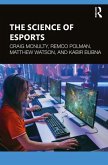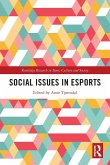This book offers new, multidisciplinary perspectives on esports, one of the most rapidly growing sectors in the sports and leisure industries.
Drawing on sociology, philosophy, education, business, economics, and sports science, this book considers the rise of esports, its impact on sports and society more widely, and the direction of travel for esports in the future. Featuring cutting-edge work from researchers in Europe, North America, and Asia, this book explores definitions of "esport" and "virtual sport," and the philosophical basis by which we understand movement and embodiment in the context of digital gaming. It considers the health and well-being needs of esports athletes, across physical, mental, and social dimensions, as well as how nutrition and training relate to performance and injury prevention. This book also considers the economics of the esports industry and how the concept of sportification can be used to describe esports' development, as well as thechallenges and debates surrounding gender and representation in esports. A final section of this book looks at esports in education, in schools and universities, and considers the future of esports for a generation of digital natives.
This book makes a useful contribution to the growing body of knowledge on esports and should be a thought-provoking read for anybody with an interest in sports studies, gaming, or the impact of technology on wider society.
Drawing on sociology, philosophy, education, business, economics, and sports science, this book considers the rise of esports, its impact on sports and society more widely, and the direction of travel for esports in the future. Featuring cutting-edge work from researchers in Europe, North America, and Asia, this book explores definitions of "esport" and "virtual sport," and the philosophical basis by which we understand movement and embodiment in the context of digital gaming. It considers the health and well-being needs of esports athletes, across physical, mental, and social dimensions, as well as how nutrition and training relate to performance and injury prevention. This book also considers the economics of the esports industry and how the concept of sportification can be used to describe esports' development, as well as thechallenges and debates surrounding gender and representation in esports. A final section of this book looks at esports in education, in schools and universities, and considers the future of esports for a generation of digital natives.
This book makes a useful contribution to the growing body of knowledge on esports and should be a thought-provoking read for anybody with an interest in sports studies, gaming, or the impact of technology on wider society.









